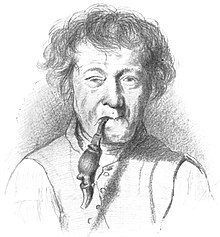Witcher
According to the early modern doctrine of witches, witchers are the male counterparts of witches . In some cases they are also referred to as magicians , magicians, Drudner, Trudner, witchers or simply as “maleficants” (culprits). The term sorcerer is mostly used in the sense of sorcerer, but can also refer to a witch finder .

Synonyms terms
The many words for "male witch" stem from the fact that a sorcerer (see Goethe's Sorcerer 's Apprentice ) represents a male witch or a magician as a master of his art, while a sorcerer is a normal person who uses witchcraft powers or skills. A Drudner or Trudner (used around 1600 ), on the other hand, is considered a herbalist, but still a culprit. In the course of time, the two terms mixed up and are now equally common and apparently the same. Already in the early modern witch trials they were referred to as "culprits", in Latin as maleficants .
This difference is also evident in old confessions, as Augustin Loss from Plaidt wrote in 1629 in his confession, “the wealthy witches and sorcerers dined in a palace, he himself was not allowed to sit at this table”.
Male and female witches
The proportion of sorcerers among the victims of the witch hunts fluctuates in the different regions of Europe and also in terms of time. At the beginning of the great witch hunt, i. H. around 1400, many men were initially victims of witch hunts. This was mainly due to the fact that the witchcraft trial had developed from the heretic trial and was initially led by the ecclesiastical inquisition. Mostly men were charged in heretic trials, only rarely women. In the dawn of modern times, witchcraft was considered a common criminal offense and increasingly prosecuted by secular jurisdiction; now the proportion of men among the victims was rapidly decreasing. It was only at the height of the witch persecution in Germany in the 1620s that men were increasingly persecuted again. Overall, around a quarter of all men accused of witchcraft were in the area of the Holy Roman Empire . In France the proportion was significantly higher.
The Drudenhaus (Malefizhaus, witch prison) was built in Bamberg in 1627 for the imprisonment of witches.
Victim of the witcher persecution
- Arndt Bottermann
- Urbain Grandier
- Matthias (Metheus) Perger, called the Lauterfresser
- Peter Stump
- Bernhard Schwarte
Other uses of the term
- In the online role-playing game World of Warcraft , the sorcerer is a playable class that can be played on different sides. He differs from the magician in many ways, as he has a variety of damaging spells and curses.
- In the online role-playing game Dark Age of Camelot , the warlock is a playable class of the Midgard faction. His specialty here is weaving different spells to use the effects of both spells so woven together.
- In the D&D based role-playing game Neverwinter Nights , the witcher is a powerful wizard who, among other things, can summon demons. The sorcerer and the magician also exist in the same game, but they differ from the sorcerer in some points.
- In the role-playing game series The Witcher , the protagonist is the witcher Geralt von Rivia, a human mutant who, in addition to his masterful ability with the sword, can also work magical symbols and is a skilled alchemist. This series of computer games developed by CD Projekt RED is based on the Geralt saga by the Polish writer Andrzej Sapkowski . In these fantasy novels, witchers serve as professional monster hunters but are considered social outsiders.
- In the game series The Legend of Zelda , the main antagonist Ganondorf is referred to as the sorcerer.
- In sports, such as ice hockey and handball , the term stands for a goalkeeper who is characterized by special, "supernatural" reflexes.
literature
- Melissantes alias Johann Gottfried Gregorii : Witches. Sorcerer. In: Gemüth's delightful historical handbook for citizens and farmers in which in the form of a brief historical lexici of all kinds of estates, arts, crafts and sciences ... , Frankfurt, Leipzig [and Arnstadt] 1744, pp. 495-532.
- Rolf Schulte: Warlocks. The persecution of men in the context of the witch hunt from 1530–1730 in the Old Kingdom . Lang, Frankfurt am Main 2001, ISBN 3-631-35556-4 (also dissertation at the University of Kiel 1999).
- Rita Voltmer: Chasing "bad people". Witch hunts in the region around the Laacher See (16th to 17th centuries) . In: Plaidter leaves . Yearbook of the Plaidter History Association. Plaidt 1.2003, pp. 11-24.
Web links
Individual evidence
- ↑ Witcher, the. www.duden.de, accessed on January 7, 2014 .